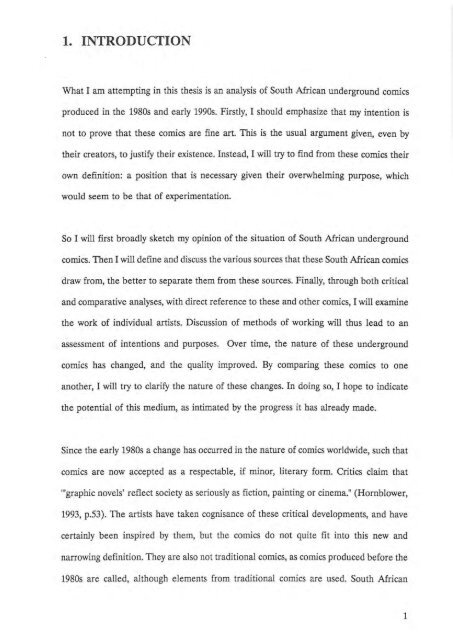Text - Rhodes University
Text - Rhodes University
Text - Rhodes University
You also want an ePaper? Increase the reach of your titles
YUMPU automatically turns print PDFs into web optimized ePapers that Google loves.
1. INTRODUCTION<br />
What I am attempting in this thesis is an analysis of South African underground comics<br />
produced in the 1980s and early 1990s. Firstly, I should emphasize that my intention is<br />
not to prove that these comics are fine art. This is the usual argument given, even by<br />
their creators, to justify their existence. Instead, I will try to find from these comics their<br />
own definition: a position that is necessary given their overwhelming purpose, which<br />
would seem to be that of experimentation.<br />
So I will first broadly sketch my opinion of the situation of South African underground<br />
comics. Then I will define and discuss the various sources that these South African comics<br />
draw from, the better to separate them from these sources. Finally, through both critical<br />
and comparative analyses, with direct reference to these and other comics, I will examine<br />
the work of individual artists. Discussion of methods of working will thus lead to an<br />
assessment of intentions and purposes. Over time, the nature of these underground<br />
comics has changed, and the quality improved. By comparing these comics to one<br />
another, I will try to clarify the nature of these changes. In doing so, I hope to indicate<br />
the potential of this medium, as intimated by the progress it has already made.<br />
Since the early 1980s a change has occurred in the nature of comics worldwide, such that<br />
comics are now accepted as a respectable, if minor, literary form. Critics claim that<br />
"'graphic novels' reflect society as seriously as fiction, painting or cinema." (Hornblower,<br />
1993, p.53). The artists have taken cognisance of these critical developments, and have<br />
certainly been inspired by them, but the comics do not quite fit into this new and<br />
narrowing definition. They are also not traditional comics, as comics produced before the<br />
1980s are called, although elements from traditional comics are used. South African<br />
1
















